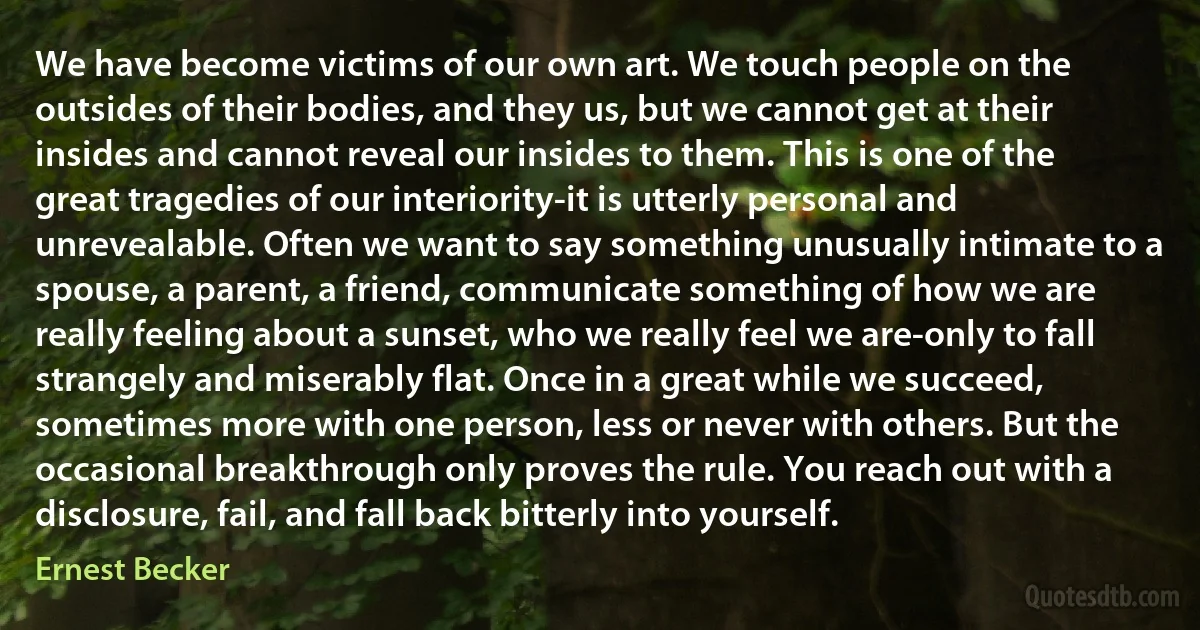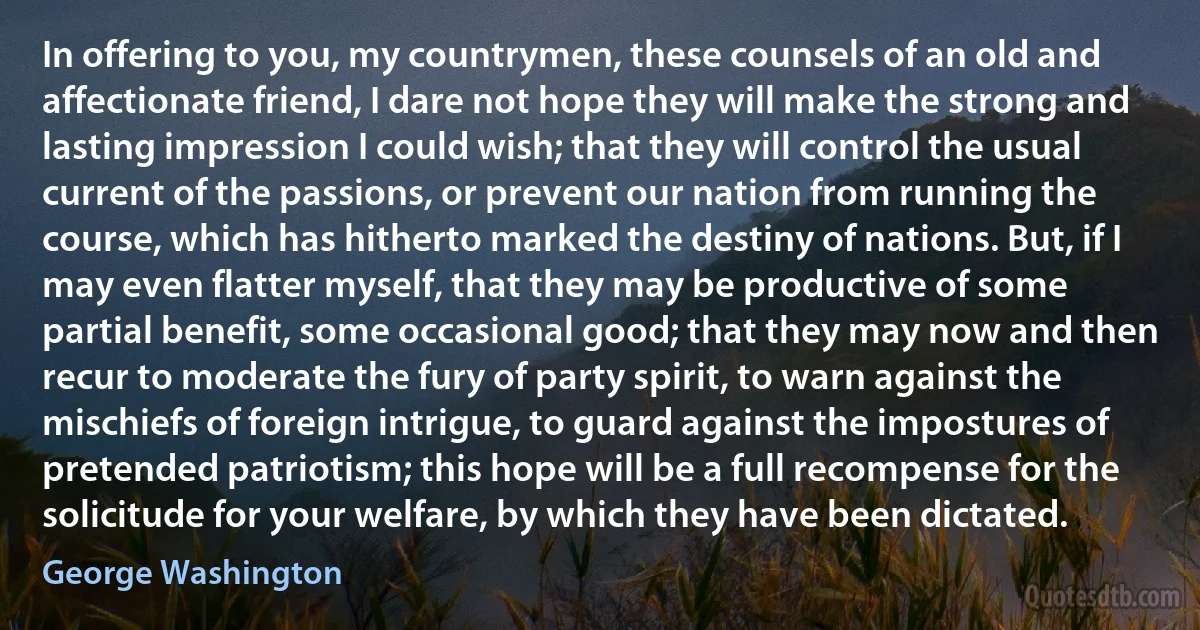Occasional Quotes - page 10
The Industrial Revolution, then, took men's occasional absence from home -- previously needed only in wartime and for hunting -- and made it the norm. This increasing division of labor magnified the division of men's and women's interests. It magnified the belief in the maternal instinct and the reality of the distant father. Prior to industrialization, divorces usually led to children living with dads. Not after.

Warren Farrell
Should any political party attempt to abolish social security unemployment insurance and eliminate labor laws and farm programs you would not hear of that party again in our political history. There is a tiny splinter group of course that believes you can do these things. Among them are a few other Texas oil millionaires and an occasional politician or business man from other areas. Their number is negligible and they are stupid.

Dwight D. Eisenhower
Well, if I were thus rationed in this article and could have but one adjective for George Gershwin, that adjective would be "ingenuous." Ingenuous at and about his piano. Once an occasional composer named Oscar Levant stood beside that piano while those sure, sinewy, catlike Gershwin fingers beat their brilliant drum-fire-the tumultuous cascade of the "Rhapsody In Blue," the amorous languor of "The Man I Love," the impish glee of "Fascinating Rhythm," the fine, jaunty, dust-spurning scorn of "Strike Up the Band." If the performer was familiar with the work of any other composer, he gave no evidence of it. Levant (who, by the way, makes a fleeting appearance in the new Dashlell Hammett book, under the guise of Levi Oscant) could be heard mutterIng under his breath, "An evening with Gershwin Is a Gershwln evening." "I wonder," said our young composer dreamily, "if my music will be played a hundred years from now." "It certainly will be," said the bitter Levant,"if you are still around."

George Gershwin
That miracles are things in themselves possible, must be allowed so long as it is evident that there is in nature a power equal to the working of them. And certainly the power, principle, or being, by whatever name it be denominated, which produced the universe, and established the laws of it, is fully equal to any occasional departures from them. The object and use of those miracles on which the christian religion is founded, is also maintained to be consonant to the object and use of the general system of nature, viz. the production of happiness. We have nothing, therefore to do, but to examine, by the known rules of estimating the value of testimony whether there be reason to think that such miracles have been wrought, or whether the evidence of Christianity, or of the christian history, does not stand upon as good ground as that of any other history whatever.

Joseph Priestley
It will hardly be expected from a work making so little pretension as this to scientific accuracy and completeness, that the remarks which my plan necessarily leads me to make, concerning the aborigines of western America, should be either critical or comprehensive. ...I propose, in the few following pages, to record such facts as shall seem to be most novel, and to corroborate, in my humble measure, occasional others which have before been related.

Josiah Gregg
It is true that our folk have used alcohol in rituals in ages past, and there is some evidence that an occasional beer or glass of wine is actually healthy. But, if you cannot control your drinking, then be honest about it and abstain. Booze has destroyed more of our folk over the eons of time than can be imagined.

David Lane (white nationalist)
It may be remarked here in passing that Prof. Thapar also demonstrates her very weak grip on religious issues with her little excursus on the occasional Muslim interpretation (rendered more plausible by the imprecision of the Arabic script in transcribing Indian words) of Somanâtha as "Somanât”, and hence of the temple as a place where the Arabian Goddess Manât was worshipped. In spite of her own position, she actually hits the nail on the head in her rendering of what she describes as Turco-Persian myth-making: "The link with Manat added to the acclaim for Mahmud. Not only was he the prize iconoclast in breaking Hindu idols, but in destroying Manat he had carried out what were said to be the very orders of the Prophet.”.

Koenraad Elst
So it was done: one administration, Democratic, succeeded another, Republican. ...She had heard nothing from the Department of Labor; her predecessor, William N. Doak... did not plan any ceremonial welcome. ...Except for an occasional fee from an article or speech, she had only her salary as a cabinet officer, $13,000 a year, to support herself, her child and husband. Sussana was doing well at the Brearly School and [her husband, Paul] Wilson was in a sanitarium... able, on occasion to come home. ...In Washington Perkins felt she... could afford, only a small apartment or a single room.

Frances Perkins
Brodie wasn't inhibited or shocked by matter publicists in and out of RAND flaunted as the most advanced, most modern of developments. After all, he wasn't ashamed to talk to his colleagues about his psychoanalysis. He was too snugly burrowed in his liberal arts to enjoy the gyrations of simulation. His instruments of research were antiquated: no computers, no interdisciplinary teams, just his noggin, the library, table-talk, and the occasional colloquy.

Bernard Brodie
Ours will neither be a perfect world, nor a world without disagreement and occasional violence. But it will be a world where the overwhelming majority of national leaders will consistently abide by the rule of world law, and those who won't will be dealt with effectively and with due process by the structures of that same world law. We will never have a city without crime, but we would never want to live in a city that had no system of law to deal with the criminals who will always be with us.

Walter Cronkite
I feel the desire to be with you all the time. Oh, an occasional absence of a week or two is a good thing to give one the happiness of meeting again, but this living apart is in all ways bad. We have had our share of separate life during the four years of war. There is nothing in the small ambition of Congressional life, or in the gratified vanity which it sometimes affords, to compensate for separation from you. We must manage to live together hereafter. I can't stand this, and will not.

Rutherford B. Hayes
Rucker sings of loss and despair as if they've left him shell-shocked. But Hootie -- born at frat parties and still a bar band at heart -- know how to deliver beers-and-tears material, and the occasional anti-racist slam, with a smile. The same sly grin crept into songs of frustration -- country writer Radney Foster's "A Fine Line" and the Who's "I Can't Explain." But Rucker is no more Charley Pride than Bryan is Pete Townshend.

Darius Rucker
We learn particularly from the Timaeus of Plato, that the Egyptians believed the world to be subject to occasional conflagrations and deluges, whereby the gods arrested the career of human wickedness, and purified the earth from guilt. After each regeneration, mankind were in a state of virtue and happiness, from which they gradually degenerated again into vice and immorality. From this Egyptian doctrine, the poets derived the fable of the decline from the golden to the iron age.

Charles Lyell
I endeavoured to sketch out (and it was, I believe, the first systematic attempt to accomplish such a task) the laws which govern the extinction of species, with a view of showing that the slow, but ceaseless variations, now in progress in physical geography, together with the migration of plants and animals into new regions, must, in the course of ages, give rise to the occasional loss of some of them, and eventually cause an entire fauna and flora to die out; also, that we must infer, from geological data, that the places thus left vacant from time to time, are filled up without delay by new forms, adapted to new conditions, sometimes by immigration from adjoining provinces, sometimes by new creations. Among the many causes of extinction enumerated by me, were the power of hostile species, diminution of food, mutations in climate, the conversion of land into sea, and of sea into land, &c.

Charles Lyell
Should any political party attempt to abolish social security, unemployment insurance, and eliminate labor laws and farm programs, you would not hear of that party again in our political history. There is a tiny splinter group, of course, that believes you can do these things. Among them are H. L. Hunt (you possibly know his background), a few other Texas oil millionaires, and an occasional politician or business man from other areas. Their number is negligible and they are stupid.

Dwight D. Eisenhower
Occasional pages of history do record the faces of the "Great Destroyers" but the whole book of history reveals mankind's never-ending quest for peace, and mankind's God-given capacity to build. It is with the book of history, and not with isolated pages, that the United States will ever wish to be identified. My country wants to be constructive, not destructive. It wants agreement, not wars, among nations. It wants itself to live in freedom, and in the confidence that the people of every other nation enjoy equally the right of choosing their own way of life. So my country's purpose is to help us move out of the dark chamber of horrors into the light, to find a way by which the minds of men, the hopes of men, the souls of men every where, can move forward toward peace and happiness and well being.

Dwight D. Eisenhower


